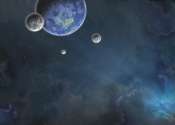Astronomers enlist AI in the search for 'lethal' baby star eruptions
Young stars—just like young humans—are prone to temper flares. But star flares can incinerate everything around them, including the atmospheres of nearby planets starting to form.

Young stars—just like young humans—are prone to temper flares. But star flares can incinerate everything around them, including the atmospheres of nearby planets starting to form.
Astronomy
Oct 26, 2020
0
83

TESS, the Transiting Exoplanet Survey Satellite, was launched in 2018 with the goal of discovering small planets around the Sun's nearest neighbors, stars bright enough to allow for follow-up characterizations of their planets' ...
Astronomy
Oct 26, 2020
2
695

For much of Earth's four and a half billion years, the planet was barren and inhospitable; it wasn't until the world acquired its blanket of oxygen that multicellular life could really get going. But scientists are still ...
Earth Sciences
Oct 26, 2020
2
385

Earth is not necessarily the best planet in the universe. Researchers have identified two dozen planets outside our solar system that may have conditions more suitable for life than our own. Some of these orbit stars that ...
Astronomy
Oct 5, 2020
23
19776

In a delightful alignment of astronomy and mathematics, scientists at MIT and elsewhere have discovered a "pi Earth"—an Earth-sized planet that zips around its star every 3.14 days, in an orbit reminiscent of the universal ...
Astronomy
Sep 21, 2020
7
9975

Earth. A new study shows other stars could have as many as seven Earth-like planets in the absence of a gas giant like Jupiter.
Astronomy
Jul 31, 2020
12
2218

When telescopes became powerful enough to find planets orbiting distant stars, scientists were surprised to see that a lot of them didn't have atmospheres like Earth's. Instead, they appear to have thick blankets of hydrogen.
Astronomy
Jul 22, 2020
1
66

The rediscovery of a lost planet could pave the way for the detection of a world within the habitable "Goldilocks zone" in a distant solar system.
Astronomy
Jul 21, 2020
0
819

The shape and size of continents control the size of ocean tides on Earth-like planets, according to a new study that simulated the effects of random continental configurations on the energy of tides. The results have implications ...
Earth Sciences
Jul 2, 2020
0
30

A team of researchers affiliated with several institutions in the U.S. and one in France has found evidence that suggests the bright patches spotted on Titan's surface 20 years ago are dry lake beds. In their paper published ...